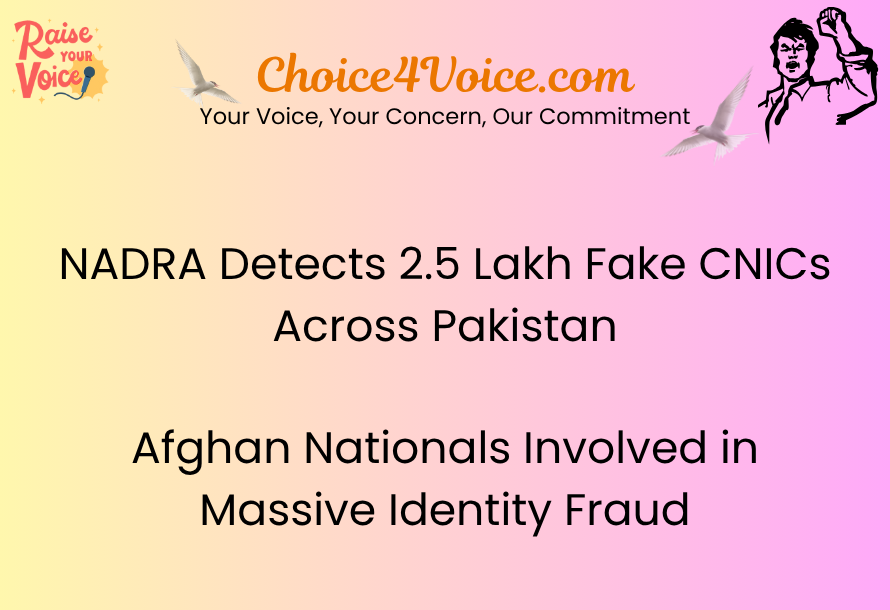If you’re experiencing this problem with this brand or any other company, submit your complaint and we may feature it on Choice4Voice.com.
Submit your complaint →The National Database and Registration Authority (NADRA) has uncovered over 250,000 fake CNICs issued to Afghan nationals through fraudulent family linkages. Learn how NADRA is blocking illegal IDs, verifying genuine citizens, and introducing the new Pak ID online system for safer, faster identity management. Full report by Choice4Voice.com
Investigation Summary
| Particular | Details |
|---|---|
| Authority Involved | National Database and Registration Authority (NADRA), Pakistan |
| Incident Type | Large-scale CNIC identity fraud |
| Number of Fake CNICs Detected | Over 250,000 |
| Main Beneficiaries | Afghan nationals fraudulently added to Pakistani family trees |
| Detection Method | Advanced NADRA software and database verification |
| Action Taken | Fake CNICs blocked; re-verification initiated |
| Next Step for Affected Individuals | Visit NADRA offices with family documents for verification |
| New System Introduced | Pak ID website & mobile app for online CNIC application |
| Processing Fees Announced | Rs. 400 (Normal), Rs. 1,150 (Urgent), Rs. 2,150 (Executive) |
| Free CNIC Offer | First CNIC for citizens aged 18+ issued free within 15 days |
| Source | Central Pakistan (LinkedIn Post, 2025) |
Full Story: NADRA Uncovers Major CNIC Fraud Involving Afghan Nationals
In a significant nationwide operation, Pakistan’s National Database and Registration Authority (NADRA) has identified over 250,000 fake Computerized National Identity Cards (CNICs) that were fraudulently issued to Afghan nationals.
According to official reports, agents within NADRA’s network illicitly added Afghan citizens to Pakistani family trees, enabling them to obtain CNICs illegally. This large-scale manipulation compromised Pakistan’s national identification integrity, raising concerns about border security, illegal migration, and identity misuse.
How the Fraud Was Detected
Using its latest database analysis software, NADRA’s internal audit system flagged inconsistencies in family linkages and biometric mismatches, prompting an immediate investigation. Each suspicious record was reviewed and cross-verified against original family registration data.
Officials confirmed that the majority of fake CNICs were linked to areas bordering Afghanistan, though such irregularities were detected nationwide.
NADRA’s Action Plan
To restore database accuracy and public confidence, NADRA has initiated a multi-stage verification drive:
- All fake CNICs have been blocked pending re-verification.
- Affected individuals must visit NADRA offices with valid family documents to confirm authenticity.
- Upon successful verification, genuine CNICs will be reactivated and fraudulent records permanently removed.
- Internal disciplinary actions are being taken against corrupt agents involved in the manipulation.
Launch of the Pak ID Online Application System
In a move to strengthen identity management and convenience, NADRA has officially launched its Pak ID digital platform, which allows Pakistani citizens to:
- Apply for new CNICs online
- Renew or modify existing IDs
- Track application status in real time
- Receive CNICs via courier directly at home
The Pak ID website and mobile app represent a major step in Digital Pakistan’s citizen service reform, ensuring transparency and reducing agent-level corruption.
Updated CNIC Fee Structure (2025)
| Service Type | Processing Time | Updated Fee (PKR) |
|---|---|---|
| Normal CNIC Renewal | Standard (15–30 Days) | Rs. 400 |
| Urgent CNIC Renewal | 7 Days | Rs. 1,150 |
| Executive CNIC Renewal | 2–3 Days | Rs. 2,150 |
| First CNIC (Age 18+) | 15 Days | Free of Cost |
Legal Case Can Be Filed
If fraudulent issuance or misuse of CNICs is confirmed, the following Pakistani legal provisions may apply:
- Pakistan Penal Code (PPC) – Section 420:
For obtaining government identity documents through deception or false representation. - PPC – Section 468 & 471:
For forgery of official records and use of forged documents. - Foreigners Act, 1946:
For illegal residence and misrepresentation by non-citizens. - NADRA Ordinance, 2000 – Section 31:
For tampering with or falsifying national identity records. - Anti-Corruption Act, 1947:
For involvement of officials in accepting bribes or manipulating identity data.
How Choice4Voice.com Can Help Victims of Identity Misuse
Choice4Voice.com is committed to defending individuals whose data or documents have been misused for fraudulent registration. Here’s how our platform supports victims:
- Publishes verified fraud cases to raise awareness and pressure authorities for swift action.
- Guides individuals on filing FIRs or cybercrime complaints related to identity misuse.
- Provides pre-drafted legal templates for reporting identity theft to NADRA or law enforcement.
- Connects victims to advocacy groups specializing in digital identity rights.
- Tracks case updates and ensures transparent follow-up for accountability.
You can submit your verified complaint directly via the official complaint form on Choice4Voice.com.
Step-by-Step: How to Report a Fake or Misused CNIC
- Visit your nearest NADRA office with family registration documents.
- Request a family tree verification printout to identify any suspicious entries.
- File a written complaint if an unauthorized person appears in your record.
- Submit your details to FIA Cybercrime Wing through https://www.nr3c.gov.pk.
- Monitor your CNIC status via the Pak ID app or https://id.nadra.gov.pk.
- Retain receipts and acknowledgment letters for all submissions for legal reference.
Source Information
This report is based on a verified LinkedIn update posted by Central Pakistan, a credible digital news outlet with over 870 followers, focusing on corruption, public safety, and digital reforms across Pakistan.
Frequently Asked Questions (FAQs)
1. What is the total number of fake CNICs detected?
Over 250,000 fake CNICs were identified by NADRA nationwide.
2. Who were the main beneficiaries of the fraud?
Most fraudulent CNICs were issued to Afghan nationals illegally added to Pakistani family trees.
3. How did NADRA detect the fake CNICs?
Through advanced data verification software and cross-matching family records.
4. What should affected individuals do now?
They must visit NADRA offices with family verification documents to validate their identity.
5. Will genuine citizens face any penalties?
No. Legitimate CNICs will be reactivated once verification is complete.
6. Is NADRA taking legal action against its own agents?
Yes. Internal investigations and disciplinary measures are underway.
7. What is the Pak ID app?
It’s NADRA’s official online CNIC application system for applying and tracking IDs from home.
8. Is the first CNIC now free?
Yes. Citizens aged 18 and above can get their first CNIC free within 15 days.
9. What are the new CNIC renewal fees?
Rs. 400 (Normal), Rs. 1,150 (Urgent), Rs. 2,150 (Executive).
10. Can Pakistani citizens abroad apply online?
Yes, through the Pak ID website, which also supports overseas CNIC applications.
11. What happens to blocked fake CNICs?
They remain permanently invalid unless verified with authentic documents.
12. How can I check if my CNIC is genuine?
Use NADRA’s SMS verification service or the Pak ID app.
13. How many employees are under investigation?
NADRA has not disclosed numbers, but internal audits are ongoing.
14. Does this fraud affect passport issuance?
Yes. CNIC fraud can lead to passport suspension or cancellation.
15. Can victims file a police complaint?
Yes, under Sections 420 and 468 of PPC.
16. Will Afghan nationals be deported?
Those found using fake CNICs will likely face deportation or criminal proceedings.
17. How does NADRA prevent future fraud?
By using AI-driven family linkage verification and biometric cross-checking.
18. Can citizens verify family trees online?
Yes, through NADRA’s online verification portal after logging into Pak ID.
19. What is Choice4Voice.com’s role here?
To spread verified information and assist victims of identity misuse in filing complaints.
20. How long will the re-verification process take?
Typically 2–4 weeks, depending on document accuracy and regional workload.



